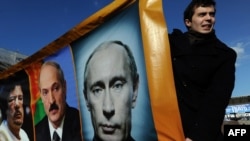On April 12, Russia’s state-owned Sputnik Arabic News said it interviewed Salimah Abdullah Qaddafi, identified as the first female bodyguard for the late Libyan dictator Muammar Qaddafi.
Sputnik said the former bodyguard spoke about NATO’s 2011 intervention in Libya, which followed the United Nations’ authorization of military action and a no-fly zone in response to the Qaddafi regime’s brutal suppression of protests that evolved into an armed rebellion against him.
Sputnik provided no photos or further information about Salimah Abdullah Qaddafi. However, it cited a video circulating on social media of the late Libyan dictator speaking to supporters about what he called NATO’s “greedy” interests in Russia and how they were similar to its “greedy” interests in Libya.
“Why is NATO marching towards Russia? The goals of NATO are the same goals of Napoleon and Hitler, is to reach gas, petrol, coal and iron in Russia and occupy Russia. This is very clear,” Qaddafi says in the video. “They occupy Libya for its oil and petrol.”
Sputnik quoted Qaddafi’s ex-bodyguard as saying: “Everyone knows what the crusade alliance [NATO] did and still doing. A long time ago I heard Qaddafi foretell the conflict happening today between NATO and Russia.”
The Sputnik report misleadingly describes NATO’s mission in Libya at the time. Moreover, the implication that NATO is after both Libya’s and Russia’s oil reserves is unsubstantiated.
Libya has the world’s ninth-largest oil reserves, the most in Africa. Historically, Europe has been the country’s biggest customer. Sputnik’s story comes as European nations, which rely heavily on Russian oil and gas, are looking to embargo Russian oil as punishment for attacking Ukraine.
On April 14, Russian President Vladimir Putin warned that banning Russian energy imports would damage the global economy and blamed European countries for spiking energy prices.
Putin spoke after the Paris-based International Energy Agency (IEA) predicted that damage to Russian energy exports will start hitting hard in May. In addition to Western sanctions, China is expected to cut its demand for Russian energy products, and OPEC Plus, oil-producing countries led by Saudi Arabia, will likely increase production, the IEA said.
Toril Bosni, the IEA’s head of the oil market division, told Bloomberg News that domestic demand in Russia has fallen, and international buyers are reluctant to purchase Russia’s oil.
“Russian oil supply could fall back by three million barrels a day starting from May,” Bosni said.
Russia is the world’s second-largest oil exporter, and was providing nearly 12 percent of global exports in 2020, according to Investopedia. Oil and gas revenues accounted for 45% of Russia’s federal budget in 2021, according to the IEA.
The United States and 30 other countries that are IEA members have agreed to release 240 million barrels of oil from stockpiles in coming months to help keep prices from rising thanks to the Ukraine invasion. Most is from U.S. supplies.
The U.S. already has banned oil, natural gas and coal imports from Russia. Britain said it will phase out Russian oil by the end of the year, allowing time to find alternative suppliers.
For some European countries, however, sanctioning Russia’s gas and oil remains challenging. Russia provides 40% of Europe’s natural gas, and Europe buys half of Russia’s oil output.
Still, on April 7, the European Parliament adopted a resolution calling to punish Russia’s energy sector, including “an immediate full embargo on Russian imports of oil, coal, nuclear fuel and gas.”
Russia has been playing up anti-Western sentiment in the Middle East and Africa.
Regarding Libya, Russia’s ties to Qaddafi date back to the mid-1970s, when the country was one of the Soviet Union’s best customers for military equipment, according to Federica Saini Fasanotti of the Brookings Institution.
Qaddafi visited Moscow in 1985 and again in 2008, when Putin was prime minister. Then, Putin was willing to cancel $4.5 billion in Libyan debt as part of a trade deal. “Russia was also in search of strategic bases on the Mediterranean, and Qadhafi granted Moscow access to the port of Benghazi for its fleet,” Fasanotti wrote.
U.N. moves to contain Qaddafi’s violence threatened Russian business dealings with Libya, including a $2.2 billion rail project, and Russia abstained from the 2011 no-fly zone vote.
A decade later, Libya remains mired in a civil war, with Russia providing mercenaries to back strongman Khalifa Haftar and his Libyan National Army against the Government of National Accord, which has received support from Turkey.
Control of Libya’s oil remains at stake. Haftar’s control over major oil fields in the east allowed him to organize an oil blockade in 2020. A ceasefire has been in place for 18 months, but a U.N.-facilitated effort to hold elections in December failed. A political standoff persists.
Libya’s oil production is now about 1.3 million barrels a day, Reuters reported last month. The United States has proposed a financial mechanism to make handling of the country’s oil revenues more transparent while talks to resolve the political conflict continue.
